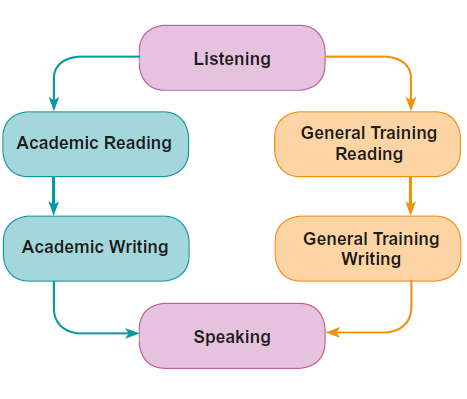What is IELTS?
IELTS is the International English Language Testing System which tests English proficiency across the globe. Conducting 1.7 million tests in 2011 globally, IELTS is the world’s most popular high stakes English language proficiency test.
IELTS General Training – for school, work or migration
The General Training format focuses on basic survival skills in broad social and workplace contexts. It is typically for those who are going to English-speaking countries to do secondary education, work experience or training programs. People migrating to Australia, Canada and New Zealand must sit the General Training test.
IELTS Academic – Institutions of Higher and Further Education
The Academic format is, broadly speaking, for those who want to study or train in an English-speaking university or Institutions of Higher and Further Education. Admission to undergraduate and postgraduate courses is based on the results of the Academic test.
Make sure you know which one you need before you book your test. What do you want to do? The version you need:
If you want to:
study at university at undergraduate or postgraduate level; or
join a professional organisation in an English-speaking country
You should take IELTS Academic
If you want to:
train or study at below degree level
work or undertake work-related training in an English-speaking country
emigrate to an English-speaking country
You should take IELTS General Training
Everyone takes the same Listening and Speaking tests, regardless of which version they take. The Reading and Writing tests differ in content, depending on whether you are taking IELTS Academic or IELTS General Training.
The Listening, Reading and Writing tests are all on the same day one after the other, with no breaks in between them. They are always taken in this order. The Speaking test will either be after a break on the same day as the other three tests, or up to seven days before or after that. This will depend on your test centre.

IELTS Academic and IELTS General Training are assessed at exactly the same levels.
IELTS scores
IELTS scores is based on each for the four skills on a scale of 1 – 9, and you will also be awarded an overall band score. You can score whole (e.g., 5.0, 6.0, 7.0) or half (e.g., 5.5., 6.5, 7.5) bands in each part of the test.
This is a very helpful breakdown of the key differences between the IELTS General Training and Academic tests. Many test-takers get confused about which one to choose, so it's great that you've clearly explained the purpose, structure, and target audience for each. I especially appreciate the comparison of the reading and writing tasks—those sections often trip people up! Thanks for the clarity. audi service near me